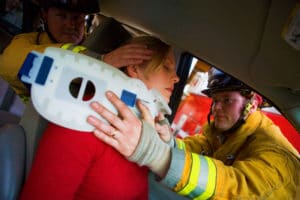
An amusement park lawsuit may be an option for people who have been injured through no fault of their own at an amusement park, fair or carnival. Every year, nearly 400 amusement parks and carnivals across the U.S. attract more than 300 million visitors with thousands suffering injuries serious enough to warrant a trip to the emergency room. People who have been injured at amusement parks and carnivals may be eligible for compensation with the assistance of a personal injury attorney.
For more information, contact Attorney Group today. Our consultations are free, confidential and without any obligation on your part. We can help answer your questions, and if you choose to pursue a claim we can connect you with an affiliated attorney who can assist you throughout the legal process.
Amusement Park Accidents
In a Consumer Product Safety Commission analysis of amusement rides at parks and carnivals, an estimated 37,154 people were injured seriously enough to be treated in hospital emergency rooms in 2011. Of those, 35,977 were released, and 1,177 were admitted to the hospital or died. Amusement park accidents are not limited to just traditional amusement park rides. Accidents also occur at state fairs, animal and safari parks, water parks, and carnivals.
According to Science Daily, on average, a child is treated in an emergency department every other hour in the US for injuries on amusement rides, according to the first national study to examine those types of accidents in depth. Researchers investigated amusement ride injuries from 1990 to 2010 and found nearly 93,000 children were injured on rides including roller coasters, merry-go-rounds and coin-operated rides.
Injuries on amusement park rides may occur because:
- Employees did not secure a patron properly
- Ride operators did not follow proper safety procedures
- The ride itself is designed improperly
- The amusement park did not maintain or conduct safety checks on the rides
The most common type of injuries sustained in amusement park accidents include:
- Traumatic brain injury
- Broken face bones
- Spine injuries
- Neck injuries
- Internal injuries
- Broken legs
- Amputations
- Lacerations
- Electrocution
- Whiplash
- Physical or sexual assault
- Heart attack (some rides may induce cardiac arrest)
- Drowning (at water parks)
- Death
Where Can Amusement Park Accidents Occur?
Amusement park accidents are not limited to just parks or fairgrounds. Large theme park operators also have hotels, motels, and other resort properties that are part of a theme park vacation package. Disneyworld is an example where the corporation has hotels and other amenities and attractions that are part of the visitors’ experience. Amusement park accidents can occur at locations including:
- Amusement parks
- Theme parks
- Hotels and lodgings affiliated with the theme park
- Holiday resorts with amusement rides
- Fairs
- Carnivals
- Water parks
- Ski parks
- Animal and safari parks
- Amusement parks in shopping malls
- Family-owned theme parks
Premises Liability

When a person is injured at an amusement park and pursues an injury claim against the amusement park, the laws of premises liability will typically be applied. Premises liability is the term for the set of laws used to determine who (if anyone) is liable when a particular condition or use of a building, land or other premises causes an injury. This includes the rides, activities and general conditions of amusement parks.
Although the rules vary from state to state, premises liability usually recognizes three different types of “entrants” on the land (trespassers, licensees and invitees) and different degrees of care owed by the owner to each type of entrant. Some states do not distinguish between the types of entrant and instead follow the rule that the amusement park owner is under a duty to make the park reasonably safe under the circumstances.
Amusement park owners and operators must make rides safe for reasonably foreseeable use. Typically, this will include adequate restraints, frequent maintenance and inspections, safety instructions and employee supervision. It is also possible that, along with a premises liability claim, a person injured by a ride could sue the manufacturer of the ride for product liability if the ride had a faulty design or an inherent defect.
As with all businesses, the amusement park owner (which is typically a corporation or other business entity), can also be liable for employee negligence. Examples of this may be failing to adequately instruct park guests about the proper use of rides or failing to control animals during shows.
Amusement Park Accidents Involving Outsourced Staff and Employees
Workers at amusement parks are sometimes outsourced contractors who operate the rides or maintain the parks and properties. These jobs may include cleaning staff, concessions staff, ride operators, and ticket attendants. These contracted workers can also suffer injury and even death while working at the amusement parks and may not have the same workers’ compensation coverage as regular employees. Outsourced workers who are injured while working at amusement parks may be eligible to file a lawsuit if their injury was the result of negligence on the part of the park owner or operator.
Amusement park owners and operators have a responsibility to ensure that employees and other workers have a safe working environment. This means ensuring that there are adequate safety controls and measures in place, that workers are properly trained to operate machinery, and that rides and other equipment are all properly maintained and functional. Failure to do so can make the amusement park owner and/or operator liable for any injuries sustained as a result.
Have You Seen an Amusement Park Lawsuit Commercial?
You may have seen an amusement park lawsuit commercial on television and wondered whether you or a loved one have been affected by the negligence of amusement park owners and, if so, whether you are eligible to pursue a claim against the amusement park owner or others. The purpose of this article is to provide you with additional information so that you have a better understanding of your options.
Amusement Park Lawsuits Filed
- A jury ordered Six Flags theme park to pay a man $4 million after he was ejected out of a roller coaster leaving the man with an uncorrectable hernia condition.
- A Walt Disney World guest was awarded $841,535 for injuries he suffered at the Florida theme park resort’s Grand Prix Raceway ride.
- The family of a man who was killed while on a trip to Disneyland was awarded an estimated $20 million.
- A man was awarded $668,000 after a waitress at a Walt Disney World hotel allegedly spilled a pot of hot coffee on the man’s lap.
How an Amusement Park Lawsuit Can Help

Amusement park owners and operators have a duty to provide a safe environment for visitors, park employees, and contracted employees. If there are risks of harm associated with their parks and rides, they also must provide adequate warnings and safeguards. If an amusement park owner fails to fulfill this duty, it could be held liable in lawsuits for injuries that may result.
People injured at amusement parks, fairs, or carnivals through no fault of their own may be eligible to recover money for:
- Medical Expenses
- Lost Wages
- Pain and Suffering
The families of those killed at amusement parks may be eligible to recover money for funeral expenses and the pain that comes with losing a loved one.
For more information, contact Attorney Group. After you contact us, an attorney will follow up to answer questions that you might have. There is no cost or obligation to speak with us, and any information you provide will be kept confidential.
Please note that the law limits the time you have to pursue a claim or file a lawsuit for an injury. If you think you have a case, you should not delay taking action.





